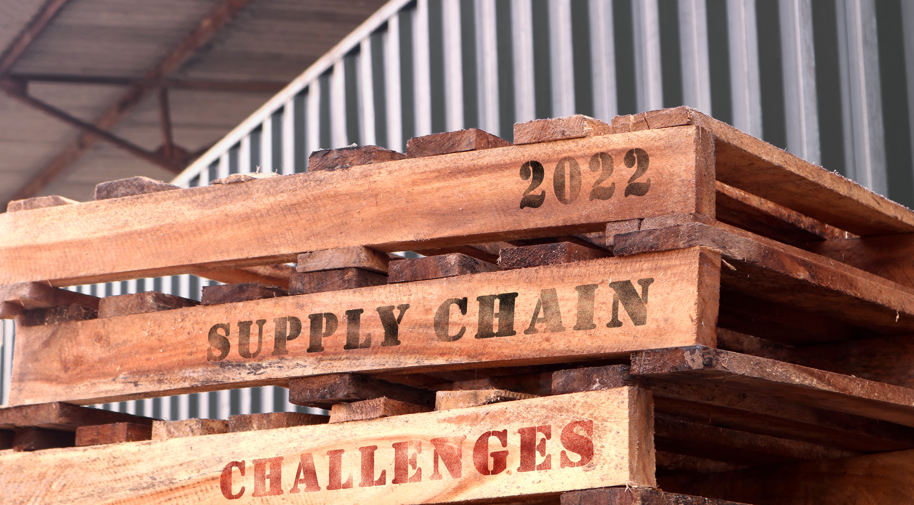
As rolling lockdowns in China wreak havoc for seven of the world’s ten biggest container ports, companies are coming to terms with the fact that supply chain disruptions around the world are becoming endemic to global trade.
In GlobalData’s 2021 ESG Strategy Survey, 69% of respondents across 20 industries felt that Covid-19 would have a high impact on their businesses in the next 12 months. While the Covid-19 pandemic brought the fragile nature of global supply chains to the fore, supply chains remain vulnerable on numerous fronts, as semiconductor shortages and geopolitics continue to wreak havoc. In addition, companies are facing growing pressure to increase their ESG credentials by being more transparent about their supply chains.
Supply chains remain weak in the face of growing disruption
It is clear that the mantra of ‘just-in-time production’ and supply chain optimization has lost some of its luster as a supply chain crisis emerges. Recently, both of these concepts resulted in manufacturers across a breadth of industries being left empty handed when delays struck the supply chains of vital components.
This was the case for the automotive industry with the semiconductor shortage. GlobalData’s light vehicle disruption tracker revealed that there were 9.4 million units lost in 2021 due to the chip shortage. Although a GlobalData survey revealed that 49% of automotive respondents felt that the automotive chip shortage would end in 2022, other forms of disruption will hamper the supply chain’s complete recovery.
We need to make supply chains more resilient, but how?
The increased frequency of shortages in key materials and components due to supply disruption led the World Economic Forum to publish its resiliency compass in July 2021. In the report, the WEF identified that only 12% of companies had resilient supply chains after surveying 360 senior executives in operations and supply chain management.
One of the dimensions of the WEF’s resilience compass was logistics systems. The organization asserted the need for greater visibility and flexibility within warehousing, inventory, and transportation. A number of companies have already positioned themselves to address this demand.
How well do you really know your competitors?
Access the most comprehensive Company Profiles on the market, powered by GlobalData. Save hours of research. Gain competitive edge.

Thank you!
Your download email will arrive shortly
Not ready to buy yet? Download a free sample
We are confident about the unique quality of our Company Profiles. However, we want you to make the most beneficial decision for your business, so we offer a free sample that you can download by submitting the below form
By GlobalDataThe emerging space economy could offer a key mechanism for increasing transparency within supply chains. The growth of low-earth orbit satellite constellations is increasing the capacity for space companies to offer real-time monitoring. Companies are already using this to respond to ESG concerns from consumers. For example, in response to growing customer pressure for greater visibility about where raw materials are sourced, Unilever collaborated with Orbital Insight, a California-based geospatial analytics company. The pilot project used extensive satellite data to trace the origins of palm oil. This has been used to prevent deforestation from taking place in pursuit of palm oil production.
Competition in the earth observation market is intensifying
This technology will become increasingly valuable as more companies consider the security of their supply chains. As a result, a growing number of space companies are offering high-resolution imagery from low-earth orbit satellite constellations. Orbital Insight draws on the satellite resources of Planet, which is currently the largest provider of high-resolution satellite imagery, with a constellation of 452 satellites. This constellation collects an impressive 350 million square kilometers of imagery a day.
Spire Global has also become a leader in satellite tracking technology. In November 2021, the company acquired exactEarth, greatly expanding its maritime vessel data in the process. Spire Global now offers aviation, maritime, and earth observation data feeds through its satellite constellation. This autonomous data collection promises more accurate tracking of imports and exports, providing much-needed transparency to supply chains. This high-resolution monitoring will reveal how disruption plays out in real time, allowing companies across all industries to build more resilient supply chains that can be adapted to cater to shifting market conditions as different drivers of disruption come to the fore.
Companies that can build resilient supply will be best positioned to weather the increasing disruption caused by raw material shortages, Covid-19 resurgences, ESG, and geopolitics. The growing earth observation market within the emerging space economy promises to play a vital role in securing the world’s supply chains.





Related Company Profiles
Unilever Plc
Spire Global Inc